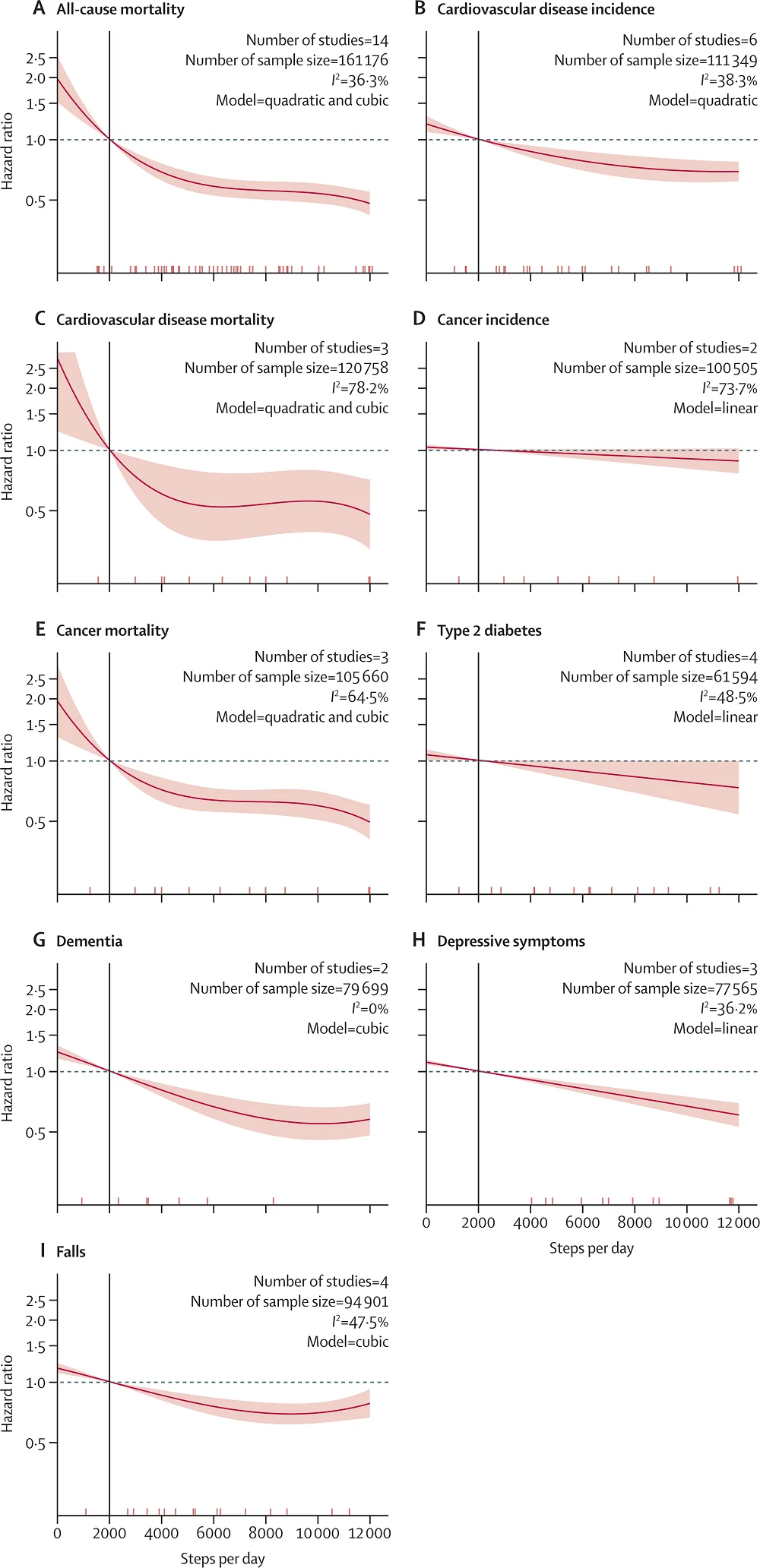7,000 Steps a Day Are Enough for Most Benefits
- Some age-related diseases are less inversely associated with walking than others.

- 7,000 steps a day seems to be sufficient for most health benefits of walking.
- Some conditions showed only small improvements with step counts beyond 7,000.
- Other conditions were more greatly improved with more exercise.
A massive new meta-analysis confirms that 10,000 daily steps are not required for most of the health benefits of walking. Around 7,000 seems to be the sweet spot [1].
A step in the right direction
“10,000 steps a day” is some of the most frequently heard health advice. It is hard to say why this particular number has become the Holy Grail of walking [2], but some recent studies have suggested that there is nothing special about it and that you can get most of the health benefits (and there are many) by clocking less steps [3].
A new review, coming from the University of Sydney and published in the journal Lancet Public Health, summarizes the current state of knowledge by synthesizing data from 57 studies from 2014 to 2025 that were conducted in more than ten countries, including Australia, the US, the UK, and Japan. This makes it the most comprehensive analysis to date on the relationship between daily steps and a wide range of health outcomes.
The sweet spot
For many outcomes, including all-cause mortality, cardiovascular mortality, cardiovascular disease incidence, dementia, and falls, the researchers discovered an inverse non-linear association, with inflection points at around 5000-7000 steps per day. This means that after this threshold, the “return on investment” was diminished. Interestingly, after the plateau at around 7,000 steps a day, all-cause, cardiovascular, and cancer mortality risks took another dip when approaching 12,000 steps.
However, several outcomes showed a linear reduction in risk as step counts increased, without a noticeable plateau. Those included cancer incidence, type 2 diabetes incidence, and the risk of depressive symptoms. The latter relationship was quite strong, suggesting that long walks are indeed good for mental health.
Compared to a baseline of 2,000 steps per day, walking 7,000 steps per day was associated with a 47% lower risk of all-cause and cardiovascular mortality, 25% lower risk of cardiovascular disease incidence, 37% lower risk of cancer mortality, 38% lower risk of dementia, 14% lower risk of type 2 diabetes, 22% lower risk of depressive symptoms, and 28% lower risk of falls. The authors emphasize that even moving from 2,000 to 4,000 steps a day was linked to substantial health benefits, including a 36% lower risk of all-cause mortality.

“Aiming for 7,000 steps is a realistic goal based on our findings, which assessed health outcomes in a range of areas that hadn’t been looked at before,” said Professor Melody Ding from the School of Public Health, a lead author of the study. “However, for those who cannot yet achieve 7,000 steps a day, even small increases in step counts, such as increasing from 2,000 to 4,000 steps a day, are associated with significant health gain. We know daily step count is linked to living longer, but we now also have evidence that walking at least 7,000 steps a day can significantly improve eight major health outcomes – including reducing the risk of cardiovascular disease, dementia and depressive symptoms.”
“For people who are already active, 10,000 steps a day is great,” said Dr. Katherine Owen, co-author and chief analyst of the study from the School of Public Health. “But beyond 7000 steps, the extra benefits for most of the health outcomes we looked at were modest.”
An achievable goal
Populational studies are notoriously noisy and cannot definitively prove causality. Combining data from several studies might be even trickier. While the researchers tried to account for this, they also admit several limitations of their study. One potential problem constantly lurking in such studies is reverse causality: people with health conditions are less capable of or amenable to physical activity, which might partially explain their prevalence in the low-activity part of the spectrum. However, researchers made an honest attempt to control for such confounding factors.
This study adds important knowledge, since 7,000 steps a day is a much more achievable everyday goal than 10,000. This does not mean that people should stop after 7,000 steps, but knowing that it is possible to get most of the health perks of walking with less effort might offer encouragement, especially to populations who might benefit from physical activity the most. “Our research helps to shift the focus from perfection to progress,” says Professor Ding. “Even small increases in daily movement can lead to meaningful health improvements.”
Literature
[1] Ding, D., Nguyen, B., Nau, T., Luo, M., del Pozo Cruz, B., Dempsey, P. C., … Owen, K. (n.d.). Daily steps and health outcomes in adults: a systematic review and dose-response meta-analysis. The Lancet Public Health.
[2] Stamatakis, E., Ahmadi, M., Murphy, M. H., Chico, T. J., Milton, K., Cruz, B. D. P., … & Gill, J. (2023). Journey of a thousand miles: from ‘Manpo-Kei’to the first steps-based physical activity recommendations. British Journal of Sports Medicine, 57(19), 1227-1228.
[3] Paluch, A. E., Bajpai, S., Bassett, D. R., Carnethon, M. R., Ekelund, U., Evenson, K. R., … & Fulton, J. E. (2022). Daily steps and all-cause mortality: a meta-analysis of 15 international cohorts. The Lancet Public Health, 7(3), e219-e228.







